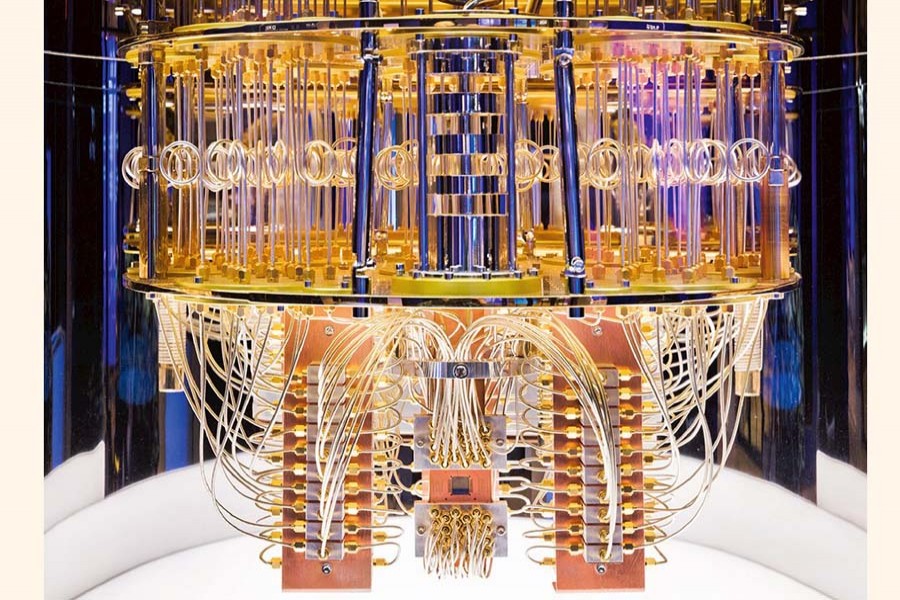
Published :
Updated :

Quantum computing is a sort of computing that uses the collective features of quantum states to accomplish calculations, such as superposition, interference, and entanglement. Quantum computers are machines that are capable of doing these quantum computations.
In recent years, the world has seen a lot of hype around quantum computers where they are seen as magical supermachines that will revolutionise the world of computing. But the reality, though, is not so simple.
Firstly, while quantum computing may help accelerate the solving of some specific type of problems, in many other cases, it may not help at all, as computer scientist Scott Aaronson writes in the Quanta Magazine. Secondly, even for use cases, building that computer physically is extremely challenging given how it needs a nuclear research byproduct and special superconducting cable that exclusively one Japanese company can make, according to Martin Giles’ report in MIT Technology Review.
Recent developments in quantum computing mostly revolve around achieving quantum supremacy, the point at which a quantum computer can execute a calculation that a classical computer cannot in an acceptable length of time. However, this feat will not overcome any of the problems associated with the practicality of quantum computers.
In a paper published by Nature, Google AI claimed to be the first to achieve quantum supremacy by utilizing a device with 54 qubits, the quantum counterpart of ordinary computer bits, to do a random sampling calculation. But this achievement was essentially useless in its real-world implications and whether Google’s claim was credible is still a topic of debate, after researchers of IBM disputed this claim in a report by Science Magazine.
Since then better algorithms have been developed for solving these sampling problems. In 2021, a team from China's University of Science and Technology solved a more challenging sampling problem with 56 qubits, and then went even further with 60 qubits according to New Scientist, a science and tech magazine based in London.
According to IBM scientist Dr. Bob Sutor, this game of leapfrog with achieving quantum supremacy has yet to have a significant real-world influence. Scott Aaronson also feels similarly in his column in Quanta Magazine, where he opines that meeting specific, esoteric benchmarks is a long way off from practical applications like breaking cryptographic codes and simulating chemistry.
Nir Minerbi, the co-founder of Classiq, a quantum software company, is more hopeful. He expects that in 2022, quantum supremacy will be demonstrated in a useful problem.
"Do you remember when the first electric cars were released? They were useful for driving to the grocery store, but not for driving 300 miles to drop off your child at college. Quantum computers, like electric cars, will improve over time, making them usable in a broader range of applications," he argues while speaking to the New Scientist.
Another challenge in making quantum computing practical is how prone to error the computations are due to quantum decoherence and other quantum noises. Quantum error correction (QEC) is the response to this challenge where researchers develop codes to rectify errors as they occur.
In July 2021, Google revealed in an article published in Nature that its Sycamore processor could detect and correct mistakes in superconducting qubits, although the extra hardware required to do so introduced more errors than it fixed.
But in another paper also published in Nature in October 2021, the first experimental demonstration of a QEC code was done by a team from Joint Quantum Institute. This development has been dubbed foundational and a landmark step in quantum computing in the report by the University of Maryland in the magazine phys.org.
So overall, it is still early days. Most of the challenges in making quantum computers practical tools are still difficult to address in the present scientific landscape, but some of them are being addressed. Thus, while 2022 may not be the year when quantum computers become useful instruments, the developments in this year may take us much nearer to that point.
sadman.fakid69@gmail.com


 For all latest news, follow The Financial Express Google News channel.
For all latest news, follow The Financial Express Google News channel.